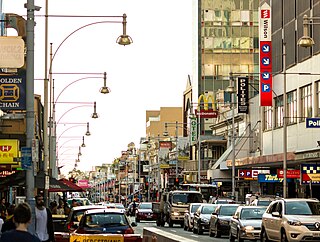
The Victorian Legislative Council is the upper house of the bicameral Parliament of Victoria, Australia, the lower house being the Legislative Assembly. Both houses sit at Parliament House in Spring Street, Melbourne. The Legislative Council serves as a house of review, in a similar fashion to its federal counterpart, the Australian Senate. Although it is possible for legislation to be first introduced in the Council, most bills receive their first hearing in the Legislative Assembly.

The Legislative Council, or upper house, is one of the two chambers of the Parliament of South Australia. Its central purpose is to act as a house of review for legislation passed through the lower house, the House of Assembly. It sits in Parliament House in the state capital, Adelaide.
The Government of South Australia, also referred to as the South Australian Government or the SA Government, is the executive branch of the state of South Australia. It is modelled on the Westminster system, meaning that the highest ranking members of the executive are drawn from an elected state parliament. Specifically the party or coalition which holds a majority of the House of Assembly.

The Parliament of South Australia is the bicameral legislature of the Australian state of South Australia. It consists of the 47-seat House of Assembly and the 22-seat Legislative Council. General elections are held every 4 years, with all of the lower house and half of the upper house filled at each election. It follows a Westminster system of parliamentary government with the executive branch required to both sit in parliament and hold the confidence of the House of Assembly. The parliament is based at Parliament House on North Terrace in the state capital of Adelaide.

Boyle Travers Finniss was the first premier of South Australia, serving from 24 October 1856 to 20 August 1857.

State elections were held in South Australia on 10 March 1973. All 47 seats in the South Australian House of Assembly were up for election. The incumbent Australian Labor Party led by Premier of South Australia Don Dunstan won a second term in government, defeating the Liberal and Country League led by Leader of the Opposition Bruce Eastick.

Sir Samuel Davenport was one of the early settlers of Australia and became a landowner and parliamentarian in South Australia.

Hindley Street is located in the north-west quarter of the centre of Adelaide, the capital of South Australia. It runs between King William Street and West Terrace. The street was named after Charles Hindley, a British parliamentarian and social reformist.

Colonial elections were held in South Australia from 9 April to 23 April 1890. All 54 seats in the South Australian House of Assembly were up for election.

Dr Charles George Everard MD was a physician, pioneer farmer and Member of the Legislative Council, in the early days of South Australia.

James Robert Wilshire was an Australian politician. He was a member of the New South Wales Legislative Council between 1855 and 1856 and again from 1858 until his death. He was also a member of the New South Wales Legislative Assembly for one term between 1856 and 1857.

Bourn Russell was a British/Australian mariner, pastoralist, politician and businessman. He was a member of the New South Wales Legislative Council between 1858 and 1880. He was also a member of the New South Wales Legislative Assembly for four months in 1856.
This is a list of members of the South Australian Legislative Council from 1851 to 1855. Sixteen members were elected at the 1851 election with terms expiring in 1854. The four official members and four non-official members were nominated by the Governor on behalf of the Crown. Voting was voluntary and restricted to land-holding males. The first meeting was held on 28 August 1851 at the newly completed courthouse on Victoria Square. This council was dissolved by proclamation on 15 August 1855, and elections held for six city seats on 20 September and seven country seats on 21 September.

John Tuthill Bagot was a South Australian politician.
East Adelaide was an electoral district of the South Australian Legislative Council from 1851 to 1857 and an electoral district of the South Australian House of Assembly from 1862 to 1902.
Colonial elections were held in South Australia on 9 March 1857. All 36 seats in the South Australian House of Assembly, and all 18 seats in the Legislative Council were up for election.
Colonial elections were held in South Australia from 8 April to 27 April 1881. All 46 seats in the South Australian House of Assembly were up for election, along with six of the 18 seats in the South Australian Legislative Council.
Colonial elections were held in South Australia from 10 February to 1 March 1875. All 46 seats in the South Australian House of Assembly were up for election.
Colonial elections were held in South Australia from 9 March to 3 April 1860. All 36 seats in the South Australian House of Assembly were up for election.
Colonial elections were held in South Australia on 21 February 1851. Only 16 of the 24 seats in the unicameral Legislative Council were popularly elected but was the first occurrence of voting franchise in the colony. The 1855 election was the second and last of this type. The 1857 election was the first contest which popularly elected all members to the new bicameral Parliament of South Australia.










